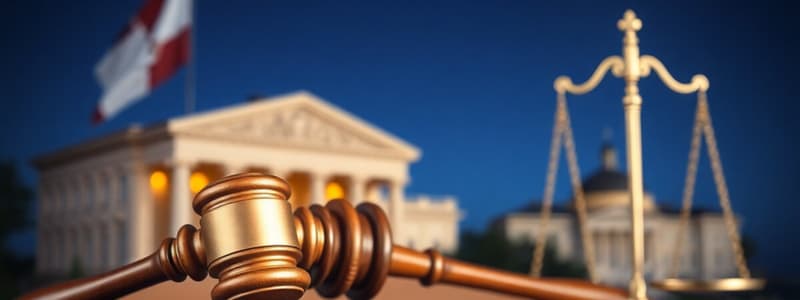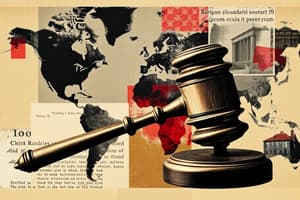Podcast
Questions and Answers
What concern did James Madison raise regarding political law?
What concern did James Madison raise regarding political law?
- It can render business plans unlawful unexpectedly. (correct)
- It encourages the expansion of private businesses.
- It provides complete protection for merchants.
- It remains static and predictable.
What was the result of U.S. manufacturers fearing civil liability, according to a survey?
What was the result of U.S. manufacturers fearing civil liability, according to a survey?
- Increased product research and development.
- Greater investment in national infrastructure.
- Reduction in the variety of products available in the market. (correct)
- Higher job creation rates in the manufacturing sector.
What principle did the Founders believe was superior to political law?
What principle did the Founders believe was superior to political law?
- The law of the jungle.
- Moral and common law principles. (correct)
- Statutory law upheld by modern governments.
- Religious doctrines exclusively.
According to Jonathan Mayhew, when does a king's authority become illegitimate?
According to Jonathan Mayhew, when does a king's authority become illegitimate?
What did President John Quincy Adams suggest gave the Constitution its vital existence?
What did President John Quincy Adams suggest gave the Constitution its vital existence?
What was indicated about the political law in the content?
What was indicated about the political law in the content?
What did many Americans take for granted, according to the author?
What did many Americans take for granted, according to the author?
What is a primary characteristic of political law as described?
What is a primary characteristic of political law as described?
What event is identified as a significant cause for the shift to political law?
What event is identified as a significant cause for the shift to political law?
How does political law affect economic progress?
How does political law affect economic progress?
Which of the following historical examples illustrates the dangers of majority rule?
Which of the following historical examples illustrates the dangers of majority rule?
What is implied about political law compared to common law?
What is implied about political law compared to common law?
What does the text suggest about people's understanding of economic issues during the Great Depression?
What does the text suggest about people's understanding of economic issues during the Great Depression?
What does political law operate on instead of fundamental laws?
What does political law operate on instead of fundamental laws?
In what way does political law create uncertainty for businesses?
In what way does political law create uncertainty for businesses?
Flashcards
Political Law
Political Law
A system of law based on the will of those in power, where laws can change quickly and arbitrarily.
Fundamental Laws
Fundamental Laws
The laws that are based on natural order and that are unchanging, regardless of human opinion.
Great Depression
Great Depression
The economic downturn caused by inflation and government intervention in the 1930s.
Government Intervention
Government Intervention
Signup and view all the flashcards
Common Law
Common Law
Signup and view all the flashcards
Brute Force
Brute Force
Signup and view all the flashcards
Majority Rule
Majority Rule
Signup and view all the flashcards
Legal Instability
Legal Instability
Signup and view all the flashcards
Political vs. Scientific Law
Political vs. Scientific Law
Signup and view all the flashcards
Unalienable Rights
Unalienable Rights
Signup and view all the flashcards
Higher Law
Higher Law
Signup and view all the flashcards
Limited Government Authority
Limited Government Authority
Signup and view all the flashcards
American Revolution's Core Principle
American Revolution's Core Principle
Signup and view all the flashcards
Foundation of a Free Nation
Foundation of a Free Nation
Signup and view all the flashcards
Founders' Belief in Natural Law
Founders' Belief in Natural Law
Signup and view all the flashcards
Study Notes
Political Law: Characteristics and History
- Political law is a system of laws based on the current power holders' decisions, rather than fixed principles like common law
- It lacks inherent logic and morality
- It is highly susceptible to change and fluctuation, making long-term planning and economic progress precarious.
- The shift towards political law occurred significantly in the 20th century, largely due to the Great Depression. Public desperation during the period led to demands for government intervention, often disregarding fundamental laws in favor of expanded force.
- Political law is the opposite of common law, which prioritizes established principles
- Democracy or dictatorship—political law remains arbitrary in both contexts, requiring obedience to power holders regardless of ethical considerations. The majority, similarly to dictators, act out their desires, not necessarily considering righteousness.
Origins of the Shift to Political Law
- The Great Depression of the 1930s played a crucial role in the rise of political law. Public confusion regarding the economic crisis led to demands that governments implement immediate solutions.
Consequences of Political Law
- Political law's instability makes long-term planning difficult for investors and businesses. Instability hinders economic progress.
- The unpredictability of political law erodes trust, discouraging investments, and potentially leading to economic slowdown and unemployment.
- Examples of negative consequences due to political instability are provided (e.g., the Reign of Terror, Salem witch trials, U.S. treatment of Native Americans)
Common Law vs. Political Law
- Common law, or scientific law, is based on logic and enduring principles, unlike political law.
- Supreme Court Justice Oliver Wendell Holmes Jr. defined law as systemized prediction, emphasizing the consistent application of legal principles.
- Pre-20th Century political law was subject to fixed ethical principles and logic
- The American Revolution was fought to uphold scientific laws against ever-increasing infringement by government officials
- Founders' belief in God-given rights to life, liberty, and property as unalienable and non-changeable, formed the groundwork for the new nation's founding documents.
Role of Religion and Morality
- American founders cited higher laws and religious principles (like God's will) as guiding forces in shaping laws, emphasizing the importance of ethical and moral standards in lawmaking
- Jonathan Mayhew's sermon (1750), considered influential in the American Revolution, argued that a king's legitimacy relied on his obedience to these higher laws.
- Mayhew highlighted the duty to disobey government laws that violate divine ones.
Criticisms and Perspectives
- The text critiques modern Americans for taking fundamental documents/principles for granted, while expressing appreciation for American values.
- There's a historical observation that the US Constitution and Bill of Rights are often not fully implemented in practice, despite their importance.
- A letter from Makram Samman (originally from Egypt) emphasizes the value of the US Constitution and Bill of Rights compared to other nations' approaches to government.
Studying That Suits You
Use AI to generate personalized quizzes and flashcards to suit your learning preferences.
Description
Explore the unique characteristics and historical evolution of political law, particularly its emergence in response to the Great Depression. Understand how political law contrasts with common law and its implications for governance under democratic and dictatorial regimes. This quiz examines the systems of power and their impacts on societal ethics and long-term planning.




